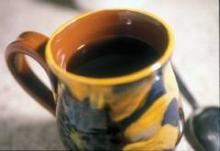Drinking tea or caffeinated or decaf coffee is unlikely to influence a person’s risk for pancreatic cancer, but consuming coffee of any kind may reduce the risk of the most common liver cancer by as much as 50% (depending on amount consumed), according to two recent studies in Clinical Gastroenterology and Hepatology.
In the pancreatic cancer study, Dr. Nirmala Bhoo-Pathy of University Medical Center Utrecht, the Netherlands, and her colleagues reported, "Our results strengthen the conclusion made by the World Cancer Research Fund and the American Institute of Cancer Research that there is little evidence to support a causal relation between coffee and risk of pancreatic cancer (Clin. Gastroenterol. Hepatol. 2013 [doi:10.1016/j.cgh.2013.05.029]).
Meanwhile, a 16-study meta-analysis of coffee intake and risk for hepatocellular carcinoma, which accounts for more than 90% of worldwide liver cancers, revealed a 40% decreased risk (relative risk, 0.60; 95% confidence interval: 0.50-0.71) for any coffee consumption vs. no consumption. Yet Dr. Francesca Bravi of Università degli Studi di Milano and her colleagues reported that their findings could not establish a causal relationship between coffee drinking and hepatocellular carcinoma (Clin. Gastroenterol. Hepatol. 2013 [doi:10.1016/j.cgh.2013.04.039]).
Even such a causal relationship may have limited clinical significance, however, considering that more than 90% of primary liver cancers worldwide can theoretically be prevented through hepatitis B vaccination, control of hepatitis C transmission, and reduction of alcohol consumption, Dr. Bravi’s team wrote.
In the first study, Dr. Bhoo-Pathy’s investigation involved inspection of 865 first incidences of pancreatic cancers reported in a cohort of 477,312 men and women from 10 European countries tracked prospectively over a mean 11.6 years of follow-up. The participants in the EPIC (European Prospective Investigation Into Nutrition and Cancer) cohort completed a dietary questionnaire at baseline in 1992, then calibrated with a 24-hour dietary recall by the final follow-up in 2000.
The 23 participating centers were in Denmark, France, Germany, Greece, Italy, the Netherlands, Norway, Spain, Sweden, and the United Kingdom, and median coffee intake across these ranged from 92 mL/day in Italy to 900 mL/day in Denmark. Among the participants with all information on coffee type intake (n = 269,593), half drank only caffeinated coffee (50%), 4% drank only decaf, a third (34%) drank both, and 12% drank no coffee. Two-thirds (66%) of the total cohort drank tea of any kind (caffeinated, green, or herbal).
Neither total intake of coffee (hazard ratio, 1.03; 95% CI: 0.83-1.27 for high vs. low intake) nor consumption of decaffeinated coffee (HR, 1.12; 95% CI: 0.76-1.63) – reported as cups drunk per day, week, or month and then converted to daily milliliters – showed a significant change in pancreatic cancer risk. Tea consumption of any kind similarly had no impact on risk (HR, 1.22; 95% CI: 0.95-1.56). These risks did not change after accounting for a range of confounders nor when analysis was confined to the 608 (70.3%) cancers that were microscopically confirmed.
Confounders included sex, clinic/center, age at diagnosis, height, weight, physical activity, smoking status, diabetes history, education level, and energy intake, including red meat, processed meat, alcohol, soft drink, tea (for coffee analysis), coffee (for tea analysis), and fruit and vegetable intake.
A comparison of moderately low and low caffeinated coffee intake initially revealed a modest increased risk for moderately low consumption (HR, 1.33; 95% CI: 1.02-1.74) that dropped below statistical significance when only microscopically confirmed pancreatic cancer cases were analyzed. Additionally, no dose-response effect was noted among any of the findings for pancreatic cancer risk.
Yet a dose-response effect was seen in Dr. Bravi’s study investigating coffee consumption and hepatocellular carcinoma risk. Her team’s update of a 2007 meta-analysis included an additional four cohort and two case-control studies, for a total of eight cohort and eight case-control studies from 14 English-language articles included in PubMed/MEDLINE between 1966 and September 2012.
When broken down by study type, the 40% overall risk reduction for any coffee consumption found among 3,153 hepatocellular carcinoma cases split into a 44% reduction in the case-control studies (RR, 0.56; 95% CI: 0.42-0.75) and a 36% reduction in the cohort studies (RR, 0.64; 95% CI: 0.52-0.78).
The dose-response relationship was seen in separate comparisons of low and high coffee consumption with no coffee consumption, using three cups a day as the cutoff in nine papers and one cup a day in five papers. Low coffee consumption reduced hepatocellular carcinoma risk by 28% (RR, 0.72; 95% CI: 0.61-0.84) while high consumption reduced it by 56% (RR, 0.44; 95% CI: 0.77-0.84).


